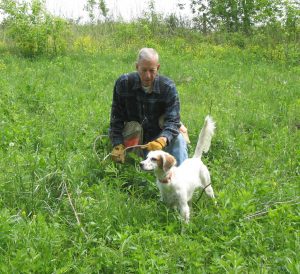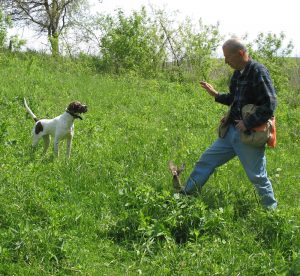Tune-Ups
Pointing Dog Pointers
By Bob and Jody Iler
Getting your car tuned up and ready for winter is pretty much a given for most folks. You might need new tires or a battery, an oil and filter change, or a lube job. The purpose of the tune up, of course, is to keep your car running at top efficiency. The time and money spent on the tune up and fall maintenance is well worth it. That “ounce of prevention” and review of performance issues helps to prevent major problems.
One focus of our training business over the years has been “tune-ups.” We’ve trained many dogs that have come back to our kennel for a month or two each fall, before hunting season, for tune-ups. You might wonder why the dog should come back to the trainer for a tune up if he or she has already been trained to a certain level – whether “started or finished.”
The obvious answer is that the training never stops!
As the young started dog hunts in his first season or two, he may show some developing bad habits that need to be addressed, just like the tune up on the car, in order to prevent bigger issues. For these dogs, the tune up will focus on and address the main problem. The very idea of training tune up implies “fine tuning” of lessons already taught; often a month or so of concentration on improving a budding bad habit is all that’s needed.
Some dogs that come in for tune ups really don’t have any glaring bad habits. They may have been lying around all summer and need some conditioning work. They may be a little lax in their response time to commands given or in handling work. And last, but most important, they’ve probably had little, if any, bird work. For these dogs, the tune up gets them recharged for the hunting season. They get out on birds, they get conditioned, and they go through a refresher course in handling well. By month’s end, they are eagerly looking forward to the hunting season.
Tune Up Issues Addressed by Trainers Include:
Bird Work
This is the primary reason owners bring their pointing dogs back to our kennel for tune ups. Nothing will get your dog tuned up for hunting season better than a month’s worth of bird work on pigeons, quail and pheasants. That’s why they’re called bird dogs, right?
Handling Issues
This is likely the second most important issue that we address in tune ups. Many owners complain of dogs that developed “hearing loss” issues during their first season. A combination of being young, enthusiastic and inexperienced will cause pointing dogs to start ranging out and ignoring whistle and voice commands. This is one issue that you want to “nip in the bud” before it gets to be a real problem. With very young dogs and puppies, we like to let them have their heads, but once they’ve had some training and a season or two below the belt, it’s time to remind them that you are hunting partners and need to work together.
Conditioning
Getting your dog in shape for the fall and winter hunting season is key. For those of us with busy work schedules, we may be lucky to get our dogs out for a daily walk, or maybe a short weekend run. Asking your dog to get out and hunt for an hour or two, or more, come hunting season – is unrealistic and unsafe if you don’t first get him or her into the best shape possible.
Retrieve Issues
After a dog has been hunted at least a season, his willingness and ability to retrieve can be assessed. Often dogs that showed little interest in retrieving as pups will start to put things together and begin retrieving on their own. And “natural” retrievers that picked up birds from the start may seem to have lost interest. Whatever the specific issue with dogs, there is usually always a reason why they do what they do. An experienced trainer will quiz you and evaluate your dog and try to find out just what’s going on. For example, we once trained a young Shorthair with tremendous retrieving potential that was later sold by his owner. The new owner ran the dog with other dogs and shot multitudes of birds over all of them. Soon our young retrieving star quit retrieving altogether. With too many birds shot over too many dogs, this poor guy was just overwhelmed. Though a month is not long enough for our “trained retrieve” program, often a lot can be done in a tune up to strengthen a natural retriever and address minor issues.
Whoa Work/Creeping
Sometimes dogs will begin to “creep” in on their birds instead of staying staunch on point. Right now we have one of these dogs at our kennel for just that issue. After a season of hunting, this exceptionally birdy Wirehair started creeping in on his birds. After a month of whoa work, he is now pointing staunchly and reliably. A focus on whoa work is important in the young dog that’s been hunted and is bird crazy; this helps him to point with intensity and learn his manners.
Backing/Honoring
Tune ups are also a good opportunity for your dog to learn to honor, or back another dog. If you hunt with a buddy, you’ll want your dog to stop and honor the other dog’s point when the occasion arises, if she doesn’t already do this. We use a silhouette and later, another trained dog, for this work.
With the exception of bird work, most pointing dog owners can do tune up work themselves if they’ve figured out where their dog’s weak areas are and feel confident that they know what to do about them. And if you’re not real sure, a consultation with a trainer before you start would be helpful, particularly with retrieving issues, as this can be a touchy area if you don’t know what to do.Do-it-Yourself Tune-Ups
For example, if you’ve access to a nice big field, you can slip your whistle around your neck, put your dog on a long checkcord, and practice quartering and whistle work and also do recall (come) drills. You don’t need to have birds to put a finely tuned edge on your dog’s handling work. You just need to put in some consistent training sessions to get her paying attention well before you turn her loose come hunting season. Some heeling and whoa work on a short 6 ft. lead will also remind your dog that you’re in charge and serve as a refresher on the basics of yard work.
As for conditioning, the home based tune up could include a regular morning session of brisk, half hour walking, beneficial to both you and your dog. As you progress in conditioning, you can lengthen the walks and add weekend or early morning/evening runs in the field while you hike along with your dog. Remember to do these activities in cooler weather and always carry a water bottle for your dog, too.
And when it comes to bird work, maybe you have a bird dog club in the area that offers use of grounds and birds for some pre-season bird work. If you have the space at home, you might purchase a dozen quail to temporarily house, feed and water, and then use for getting your dog out on birds in preparation for the season. Pigeons, too, often work well, if you know someone who keeps them and will give or sell you a few for training.
When considering work on backing/honoring, here again – if you’re familiar with what to do, you and a buddy can enact training scenarios to work your dogs on this exercise. You’ll need to have both dogs on checkcords. One of you will take his dog out and let his dog find the planted bird. As that dog goes on point, he’ll be restrained by his owner. Then the other owner will come in with his dog on a checkcord, toward the dog on point. The second dog should point the dog that is already on point. The first owner will then flush the bird, while restraining his dog, and the second owner will also restrain his dog as they watch. Then the two owners can switch scenarios and repeat.
Remember, a tune up on your car is just that – it’s not an engine overhaul! If you’re not sure what to do with your dog – don’t do any harm. Just as you’d take your car to the qualified auto technician, you may need to take your dog to the trainer! Tune ups are an invaluable tool in helping to address and fix problems with your pointing dog as they come up. They’re month long refresher courses for your bird dog, offering you both a chance to strengthen your bond together while improving performance.
Pointing Dog Pointers features monthly training tips by Bob and Jody Iler, who own Green Valley Kennels in Dubuque, Iowa. Bob and Jody have trained pointing dogs for over 35 years and have written many articles for The Pointing Dog Journal.




